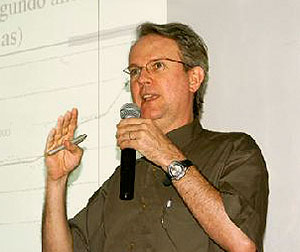Adalberto Cardoso examines the metamorphoses of the work ethics in Brazil
 |
|---|
| Sociologist Adalberto Cardoso |
Diverse aspects of how the work ethics was built in Brazil will be discussed by sociologist Adalberto Cardoso, from the Institute of Social and Political Studies (Iesp) at Rio de Janeiro State University (Uerj), during the speech Multiple Modernities and the Metamorphoses of the Work Ethics in Brazil, on August 4, at 3 pm (GMT -3), in the Faculty Room of the Institute of International Relations (IRI). It will be the third event of the cycle Carioca Afternoons: The University of São Paulo Listens to Rio de Janeiro.
PROTESTANTISM
Cardoso notes that Protestant ethics and its links with the spirit of capitalism hold methodical work in high regard and, in keeping with good morals, advocate sacrificing the satisfaction of immediate needs for the sake of greater well-being in the future. He adds that Protestant ethics also see rewards as the result of exercising a “properly understood vocation.” Thus, “entrepreneurship, individualism, and rewards for merit and hard work have replaced the idea of vocation in the bourgeois work ethic.”
SOCIALISM
The sociologist points out that an alternative work ethics has been built by organized labor in mutual support societies, labor unions and, later, political parties. This other ethics is based on “solidarity and class equality, avoiding the notion of merit and its religious justification. Its principle of justice is the socialist maxim, ‘From each according to his ability, to each according to his need,’ a principle that is possible only in the affluent society of the communist utopia.”
BRAZIL
Cardoso emphasizes that, in Brazil, the main element in the building of a work ethics was slavery, which determined the country’s social relations for centuries, giving rise to the notion of manual labor as something degrading and undignified: “Redeeming manual labor from the stigma of unworthiness took decades, and neither bourgeois ethics nor its egalitarian counterpart became essential part of the expectations of Brazilian workers throughout history.” It is over this background sociologist will discuss the construction of Brazil’s work ethics (or, perhaps, its plural work ethics).
PROFILE
In addition to being a professor and researcher at Iesp-Uerj, where he heads the Center for Labor Research and Studies (Nupet), Cardoso is an associate researcher at the Brazilian Center for Analysis and Planning (CEBRAP) and at the Warwick Institute for Employment Research Scientist, as well as grant scholar of Faperj’s “Scientist from our State” program.
With a doctor’s degree in Sociology from USP’s School of Philosophy, Letters and Human Sciences (FFLCH), he is the author of 14 books and over 70 articles published in journals and books. He currently coordinates three research projects and works in various fields of labor sociology, urban sociology (including social inequalities) and social theory. The keywords of his Lattes résumé that contextualize his academic production are unionism, class formation, labor market, productive restructuring, globalization, automotive industry, labor law, neo-liberalism, democracy, Latin America, and Vargas Era.
CYCLE
The cycle “Rio Afternoons: The University of São Paulo Listens to Rio de Janeiro” invites prominent social scientists from Rio de Janeiro to discuss various aspects of Brazilian reality, in an effort to bring together scholarly reflections on social issues from Brazil’s the two major cities. The cycle is organized by Renato Janine Ribeiro, professor of Ethics and Political Philosophy at the FFLCH-USP and coordinator of the IEA-USP’s Research Group on The Future Questions Us.
The event is open to the public and admission is free. For information and registration, please send a message to leila.costa@usp.br. The event will also be broadcast live on the Web. IRI-USP is located at Av. Professor Martins Rodrigues, Travessas 4 e 5, Cidade Universitária, São Paulo, SP (map).
English revision by Carlos Malferrari - Photo: Fiocruz
